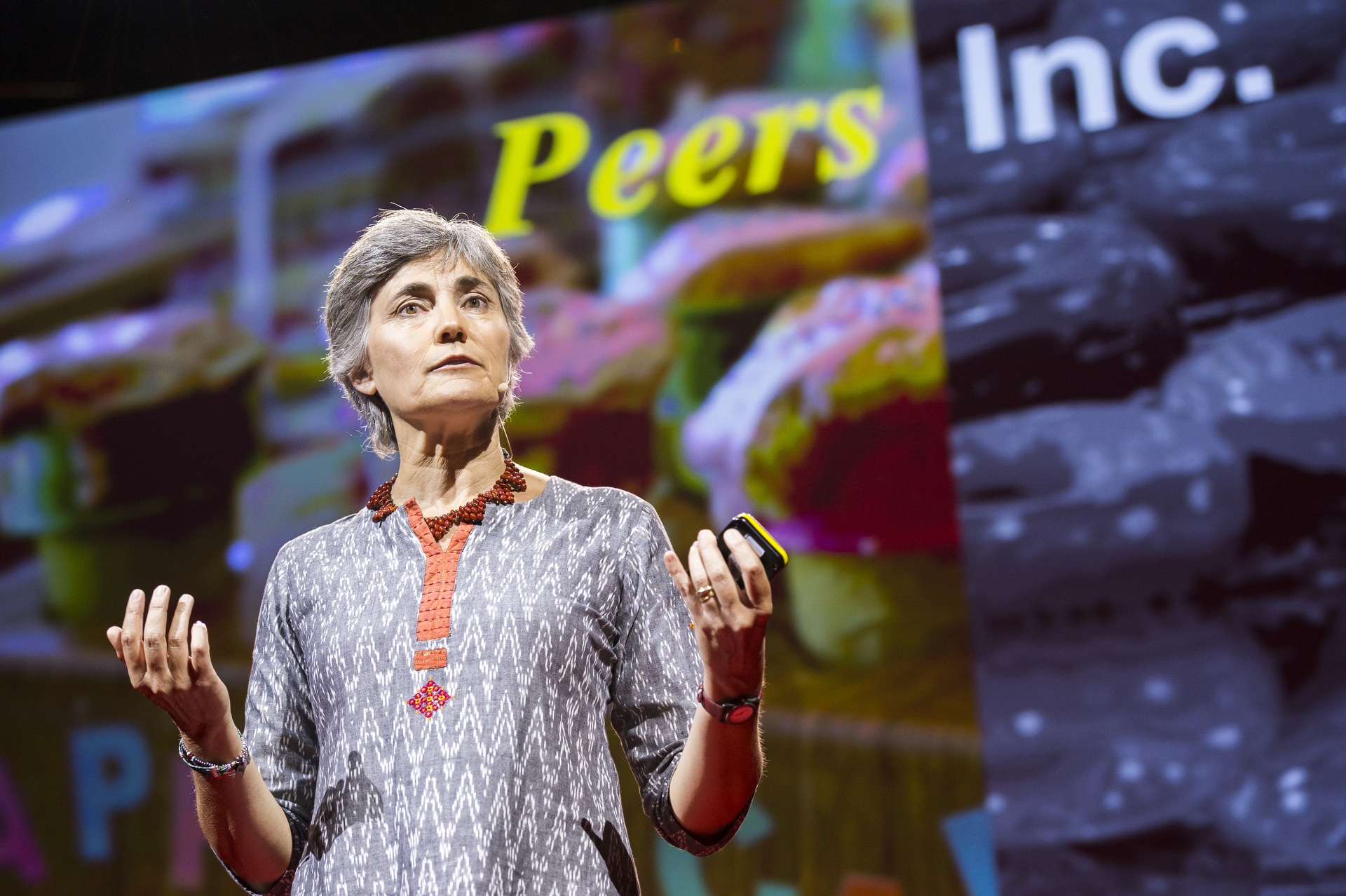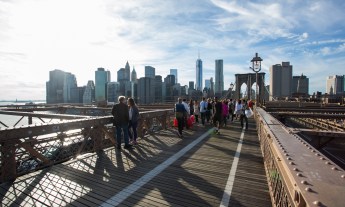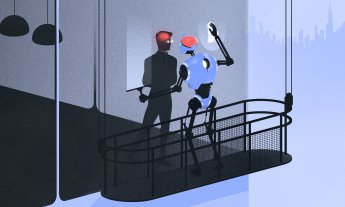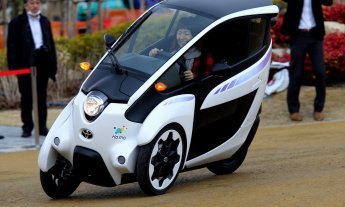
Twice, Robin Chase has stood on the TED stage and offered powerful visions for a green, and shared, transportation future. At TED2007, the Zipcar founder suggested that car sharing could be the solution to global warming, while also helping drivers without cars. She also posited an even bigger idea: a mesh network of cars that transport cellular data and Wifi along with people. At TEDGlobal 2012, Chase asked: what if our entire economy were collaborative? She shared lessons from her own experiment in the shared economy, a French peer-to-peer car rental company called Buzzcar.
Chase is a leading thinker on the future of transportation, on sharing and on minimizing our carbon footprint. In her two new projects — a vehicle communications company in Portugal and an online peer economy hub — her ideas have evolved and coalesced.
Six years after giving her first TED Talk, Chase’s dream of creating a vehicular mesh network has become a reality. Veniam Works, which Chase founded in Porto, Portugal in late 2012, turns each car into a hotspot and enables drivers to share their wireless connection. Veniam operates off a box with three radio signals — cellular, wifi, and 802.11p, a signal that creates a wireless network between cars. Each car in the system has a black box that taps into the network and creates an umbrella of coverage over the entire physical area in which the mesh-enabled cars are driving. Ultimately, Veniam creates a better wireless service for everyone. Low-cost and resilient, Veniam’s strength and future lies with every new participant. Currently, Veniam has 500 of them in the Porto metropolitan area.
Chase describes this network as transforming “dumb” machines equipped for just one function — driving — into multi-purpose devices that transport data along with people. Like Zipcar and Buzzcar before it, Chase is rethinking how we can use transportation systems to make our societies stronger.
Chase has also been busy thinking more about economies of sharing. In her 2012 talk, Chase identified a need for online platforms for the collaborative economy. Now, she’s doing just that — creating a way for individuals to share their skills and needs. She’s on the board of Peers Incorporated and Peers, a pair of organizations that showcase the businesses and individuals pioneering the shared economy. Peers Incorporated supports businesses like Etsy and Buzzcar, which link local service providers with local demand. Peers serves more of a social purpose — it’s a hub to connect individuals with local services and opportunities in their area. Neighbors sign up to bring each other flowers, fix a leaky faucet, or cook each other dinner. Chase hopes it will eventually redefine community.
Chase sat down with TED to discuss how she’s putting her big ideas into action. Below, an edited transcript of that conversation.
You’re introducing transportation innovations in locations all over the globe. What criteria do you look for when considering a location to start a program, like Veniam in Portugal or Buzzcar in France?
I’m opportunistic. [Laughs]. It was a very funny connection to Veniam — I had told my friend, no kidding, six years ago, “Here’s my dream. I want to do a vehicle mesh.” And then I got an email from her two years ago, and she said, “Robin, you asked me this question three years ago, and today I have the answer. Here’s this man who is doing what you want to do.”
So I’m working with João Barros, and it turns out that Portugal just has all the right things simultaneously right now. It’s got a really great group of engineers, and because of its economic circumstances, the city government and local companies have been very willing to do stuff with us, because they want to boost Portugal. They want to have things happen there. So we’ve had a lot of interest. But it’s really kind of intriguing to think that if you go to a place that’s economically hurting, people are willing to help and to give you a whole bunch of partnerships that they would never do in San Francisco, for example. So that’s nice.
I chose France for Buzzcar because I had this idea that France is closer to the future of transportation than the U.S. France famously did the bike-sharing, and France just started Autolib’, which is the one-way car stuff. So from an economic and car use perspective, I knew France was going to be a really great place. And it was a really great place. France has often been a forefront of transportation innovation — they were early in the airplane space, early in the car space, early for hot-air balloons, early for the Metro. It’s just a kind of funny thing, and you wonder why — but they can’t tell you why.
If you think about entrepreneurship in general — at least the disruptive, cutting-edge kind that I’ve been doing — you want to change as few parts as you can. You don’t want to have to change everything out, because it’s asking users to do too much of a leap at one time. So if we think about Zipcar, I used to get asked all the time, “Why do we not use electric vehicles?,” and I felt like I was already asking people to pay by the hour, to rent these cars, and to use cars differently — and I didn’t want to add yet another difficult cog. So if you think about Buzzcar in France, you know, people are doing a lot of sharing. They already are living car-independent lives, a lot of them. So I wasn’t asking them to change too much. I was just replacing some of the cogs. In doing disruptive innovation, you want to choose the place where people are the ripest. Where you have to transform less.
Do you think that these are models that are replicable across countries, or is this something that really fits in one specific society?
I get asked a lot if sharing is cultural. And I push back a lot on that, because I think there’s a lot more to sharing. One is that in our daily lives, all of us share all the time, without even thinking about it. You’ll give someone a ride home, you’ll lend someone something, you’ll do someone a favor. It’s an incessant thing. We don’t call it sharing, but we do it all the time.
Ultimately, it boils down to economics. And the economics of sharing assets is compelling anywhere. So I think all of these things are definitely replicable around the world.
Are you still confident in the power of collaborative economies to help us address climate change?
With the pace of change because of climate, because of sustainability, because of our energy systems, I think the more community resilience we can build into things, the better. An idea that I like a lot: We need to exercise our community muscle. And we can do that in many, many ways. There’s hyper-local, community, online — these new organizational structures. This exercising of the community muscle means that we have a kind of community muscle memory and a community muscle reflex,. So when bad things happen, or when we’re looking for solutions to big problems, we turn first towards thinking that we’re going to solve it in a community way.
If we go to the bad things that I think are going to be happening shortly, that is a much better reflex than I’m going to do some stockpiling of guns and ammo in my basement. Right? We really want people to have a community reflex. And if you look at [Hurricane] Sandy, it was really striking to me in New York — and I think it was under-appreciated — how, amazingly, there was a community response. There was no looting, and there were people hanging plugs outside their windows. A community together responded, which was not what I think people would have anticipated.
And I was just thinking about the typhoon [in the Philippines] that just happened. It’s absolute calamity, and the emergency responders aren’t nearby. They aren’t there. Which is why we need things like mesh networks. But the first responders are the community, and so we have to get ourselves into a place where the community has a mechanism, and an instinct and the memory of being the first responders. They really should be the first ones that we go to.
You made several statements in your first TED Talk about what had to change in the next 10 years to improve our environment. We’re halfway through — have we made any progress?
Oh my god! We have just 20 years in order to do something that’s pathetic — which is to give ourselves a 50/50 chance of staying at two-degree global warming. We really have to get focused on the fact that this isn’t for our children, or for our grandchildren. It is happening at this unbelievable pace right now, and we have no time. We really, honestly, truly — we’ve squandered all the time.
We can’t solve exponential problems with linear solutions. And we are absolutely facing an exponential problem right now. And this is where my response is, “try the peers-incorporated paradigm,” because it is honestly the only thing I can see that can deliver the speed and scale of what is required.
I’ve been really on the beat to get people who are thinking — who have great solutions, or who have money to pour into solutions — in terms of platforms. The best answers have to be platformized. I think there’s one of two things that everyone should be doing. One is building community, and two is building platforms. And if you aren’t working on one of those things, you’re wasting your time.
But it’s also exciting to think about. We’re now opening up all of those brilliant people, and their innovations and their creativity in really productive ways. We now are offering the ability to discover and give voice to the creativity that is found in populations.
Do you have suggestions for people who are interested in participating in this collaborative economy to get involved?
They can join Peers.org, which is a new organization that connects people participating in the shared economy. They can also use the services identified on Peers Incorporated, another website I manage. I’m trying to give the diversity of sectors in which this business model is happening, and give a flavor for why it’s a compelling business model. I just am struck again and again how incredible it is to see the diversity of things that I think are [using] this business model.
Zipcar went public about two years ago, and then Avis bought it about six months ago. While you’re not in charge any more, what innovations do you hope they’ll implement?
I think that Avis did not buy it to kill it, that’s for sure. They bought it because their competitors are doing car-sharing, because, as I said, the shared car is a giant part of the future. I think Zipcar has been not doing much innovation — in fact has done very little innovation since it got founded. So I don’t see that Avis is going to do any less innovation than what Zipcar was already not doing. I don’t think they’ve been very innovative for a while.
I think there’s a lot of space for innovation, and so they could innovate if they wanted to. If I just circle back round to the peers-incorporated business model, the ones that we find that are doing it are mostly disruptive. It’s mostly not the legacy companies opening up. Although we see examples, mostly legacy companies are not moving fast enough. So I feel that way about Avis. They could. They absolutely could. There’s no reason why they couldn’t, except for that we see big companies prefer to protect the status quo and not evolve.
What kind of spaces do you think they could evolve into? What could they learn from the past 10 years?
The connected mesh-enabled car, the other forms of transportation that include individual assets. The connection between thinking about how people are moving in cities because of technology. When Zipcar was invented, smartphones didn’t exist. Are we leveraging smartphones to the extent they can to support the whole sharing economy? So all of these things revise the increasing pressure of people living in cities. I feel like Zipcar has lots of potential there, because they’re riding major trends. Are they going to take advantage of those?















